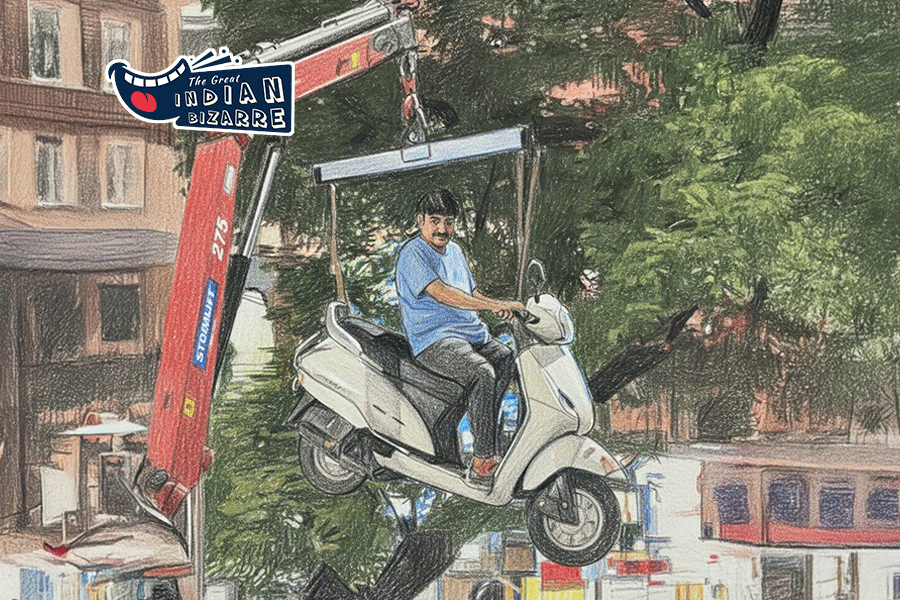From here to eternity
|
Chai, Chai: Travels in Places Where You Stop but Never Get off (Tranquebar, Rs 250) by Bishwanath Ghosh is a delightful travelogue with a difference. If you are one of those people who have wondered about the nature of the life that goes on in the quaint towns you always pass by but never get off at during railway journeys, then this is the book for you. The author stops at Mughal Sarai, Jhansi, Itarsi (in Madhya Pradesh), and Guntakal, Arakkonam, Jolarpettai and Shoranur (in south India) to listen to the stories these small towns have to tell — stories we rarely hear since “nobody ever steps out of the station to listen”. Eccentric and funny, the short pieces in this book bring to life the sights and sounds of these little-known towns. They also say much about the author, who, besides travelling, loves his whisky and is drawn towards it like a lover in every godforsaken town he visits. The fatal attraction to whisky and street food has its corollary in Ghosh’s hypochondria, which causes him to do a few quick rounds of skipping whenever his anxiety over an impending heart attack gets too much to bear.
2 States: The Story of My Marriage (Rupa, Rs 95) by Chetan Bhagat is more a screenplay than a novel. One can well imagine Bollywood pouncing upon this story of boy-meets-girl-but-family-objects. Given the fact that the writer is Chetan Bhagat, the saccharine sweetness of the story is not surprising. Every kind of stereotype is played upon — best friends (mistaken for siblings) turn lovers, traditional families on both sides (Tam Brahms vs Punjabis) turn hostile, only to become the best of friends eventually. The story ends where else but in the delivery room, with the lovely wife giving birth to lovely twins and the proud father proclaiming that the babies are not north or south Indians but only Indians. Edifying indeed.
True Detectives (Headline, Rs 295) by Jonathan Kellerman is described as “complex, sharp and superbly suspenseful”. Complex it certainly is, at least racially, since the two detective siblings are a black and a white man born of the same mother. But “sharp and superbly suspenseful” it is not. The plot is interesting up to a point, after which Kellerman loses it in the attempt to pump in too much of sex and lies. And one wonders what is meant by the adjective, “true”, in the title.
|
The Book of Lakshmi (Penguin, Rs 250) by R. Mahalakshmi is an engrossing book that explains the mythology, symbols and iconography of the goddess Lakshmi, and discusses the Ashta Lakshmi Stotram and the Kanakadhara Stotram in detail. The significance of the goddess of wealth is inextricably bound up with that of her twin, Alakshmi, who is everything that her sister is not. If Lakshmi is the typical good woman who brings order and prosperity to households, her sister breaks up homes by creating chaos. If you anger Lakshmi, she just recedes, to make way for her wild sister. As the author says, Lakshmi, the submissive one, “does not ‘do’…. [Her] inactivity is what allows her other to wreak havoc in the domestic sphere.” In being meek and dangerous at the same time, Lakshmi, the ideal for many Indian housewives, embodies a useful method of subverting patriarchy.
Anger Management (Sage, Rs 295) by Swati Y. Bhave and Sunil Saini is a well-researched book that should help doctors and lay- persons alike. It describes the physiology of anger, provides helpful tips to master it and teaches the ways to channel this negative emotion into something constructive. The section, “A-Z tips for anger management”, with its accompanying illustrations and the quote from Shakespeare — “There is nothing either good or bad but thinking makes it so” — should go a long way in helping people who have a tendency to seethe at the slightest provocation.













